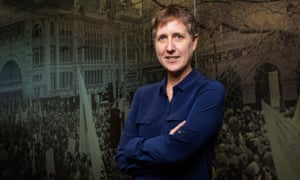The Australian Council of Trade Unions will push for a $45-a-week
increase in the minimum wage, its new secretary, Sally McManus, will say
on Wednesday.
McManus, the former ACTU campaign director who was elected unopposed two weeks ago then immediately became embroiled in controversy for her comments that she had no problem with people breaking “unjust” anti-strike laws, will call for the historic increase at the National Press Club.
The rise is 50% higher than the $30 a week the ACTU called for last year and, if granted by the Fair Work Commission in its annual minimum wage case, would be almost triple the $15.80 weekly increase it granted in 2016.
A $45-a-week increase would lift the annual minimum wage to $37,420.88.
“Building economic security for the lowest-paid workers in our society is at the core of the ACTU’s objectives, and increasing the minimum wage is one of the most effective tools available to achieve this goal,” McManus will say.
“Australia’s minimum wage has been forced down to dangerously low
levels when compared to average wages – stifling economic security for
workers and further entrenching inequality which is now at a 70-year
high.”
The latest wage price index figures, released in February, show wages growing by a record low 1.9% in 2016 – only slightly more than half the long-term average rise of 3.4%.
In the 2016 December quarter private-sector wages rose 0.4% and public sector wages grew 0.6%, a record low for both.
On 13 March the treasurer, Scott Morrison, identified increasing Australians’ earnings as “the biggest challenge” facing the Australian economy.
“Wage prices, the wage earnings of Australians have been flat, it’s been a while since they’ve had a good pay rise, and that’s what we have to work towards achieving, that they earn more,” he said.
Morrison has suggested that the government’s $48bn company tax cut plan is vital because it will increase the profitability of businesses, which it hopes will flow through to greater investment, employment and wage growth.
But in comments to Guardian Australia, McManus called for an expansion in collective bargaining rights as the best way to tackle “corporate greed” and inequality.
McManus will say on Wednesday that, according to the OECD, the benchmark for an effective minimum wage is 60% of average wages. “Our claim will move us towards this target.”
According to the United Voice union the minimum wage, now $17.70 an hour, has fallen from 65% of median earnings in 1985 to 53% in 2015.
United Voice, supported by the ACTU, has called for a 60% target, which would require the minimum wage rising from $673 a week to $738.
A spokesman for the Australian Chamber of Commerce and Industry said: “The Fair Work Commission should deliver an annual wage review outcome that is fair for jobseekers, employees and small businesses in the current fragile economy.
“Any minimum wage claim that goes beyond what the economy can bear will squeeze low-income workers out of a job.”
McManus, the former ACTU campaign director who was elected unopposed two weeks ago then immediately became embroiled in controversy for her comments that she had no problem with people breaking “unjust” anti-strike laws, will call for the historic increase at the National Press Club.
The rise is 50% higher than the $30 a week the ACTU called for last year and, if granted by the Fair Work Commission in its annual minimum wage case, would be almost triple the $15.80 weekly increase it granted in 2016.
A $45-a-week increase would lift the annual minimum wage to $37,420.88.
“Building economic security for the lowest-paid workers in our society is at the core of the ACTU’s objectives, and increasing the minimum wage is one of the most effective tools available to achieve this goal,” McManus will say.
The latest wage price index figures, released in February, show wages growing by a record low 1.9% in 2016 – only slightly more than half the long-term average rise of 3.4%.
In the 2016 December quarter private-sector wages rose 0.4% and public sector wages grew 0.6%, a record low for both.
On 13 March the treasurer, Scott Morrison, identified increasing Australians’ earnings as “the biggest challenge” facing the Australian economy.
“Wage prices, the wage earnings of Australians have been flat, it’s been a while since they’ve had a good pay rise, and that’s what we have to work towards achieving, that they earn more,” he said.
Morrison has suggested that the government’s $48bn company tax cut plan is vital because it will increase the profitability of businesses, which it hopes will flow through to greater investment, employment and wage growth.
But in comments to Guardian Australia, McManus called for an expansion in collective bargaining rights as the best way to tackle “corporate greed” and inequality.
McManus will say on Wednesday that, according to the OECD, the benchmark for an effective minimum wage is 60% of average wages. “Our claim will move us towards this target.”
According to the United Voice union the minimum wage, now $17.70 an hour, has fallen from 65% of median earnings in 1985 to 53% in 2015.
United Voice, supported by the ACTU, has called for a 60% target, which would require the minimum wage rising from $673 a week to $738.
A spokesman for the Australian Chamber of Commerce and Industry said: “The Fair Work Commission should deliver an annual wage review outcome that is fair for jobseekers, employees and small businesses in the current fragile economy.
“Any minimum wage claim that goes beyond what the economy can bear will squeeze low-income workers out of a job.”

No comments:
Post a Comment